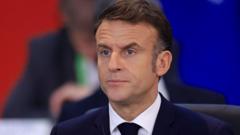In response to the lingering impact of a crippling independence debt, French President Emmanuel Macron has announced the formation of a commission consisting of French and Haitian historians. This panel will delve into the historical context of the debt and its effects on Haiti, while seeking pathways toward a more peaceful future.
Macron Establishes French-Haitian Commission to Reassess History and Future

Macron Establishes French-Haitian Commission to Reassess History and Future
A new initiative aims to explore the historical debt imposed on Haiti, potentially reshaping relations between France and its former colony.
In a significant move, French President Emmanuel Macron has declared the establishment of a commission tasked with examining the intricate historical ties between France and Haiti, specifically focusing on the monumental debt that Haiti was compelled to pay following its independence two centuries ago. This announcement comes as a response to ongoing discussions around the historical injustices stemming from colonialism and slavery.
Haiti, which declared its independence from French rule in 1804, faced the imposition of a 150 million gold franc debt in 1825, an overwhelming figure that was eventually reduced to 90 million francs. This financial burden was ostensibly compensation for former French slave owners and served to cease hostilities. The debt, which remained a weight on Haiti until its completion in 1947, has been publicly acknowledged as a critical factor in the country's enduring struggles with poverty and instability.
Macron's commission, comprised of historians from both nations, is envisioned to offer recommendations aiming at fostering reconciliation and building a better future. The French president noted the significant role this debt played in shaping Haiti's initial challenges as an independent nation, stating that it was a tangible representation of historical injustices.
However, the commission's potential to address financial reparations remains unclear. Previous French administrations have recognized the historical wrongs associated with slavery, yet discussions around the reparative aspects of the independence debt have been notably absent from mainstream political discourse.
In a recent interview, Haitian writer Monique Clesca articulated concerns regarding France's waning influence in its colonial territories, particularly in Africa, suggesting that Macron’s recognition of the injustice surrounding the independence debt could lead to a pivotal change in relations. Clesca emphasized that while recognition of past wrongs may not erase the past, it could help alleviate some ongoing grievances.
As Haiti grapples with severe economic instability, rampant gang violence, and a lack of effective governance, the panel's recommendations could hold significant implications for both nations and their future interactions. With over 5,500 lives lost to gang-related violence in 2024 alone and more than one million people displaced, the urgency for sustainable political solutions in Haiti is paramount, as efforts to reinstate democratic order remain stagnant.





















